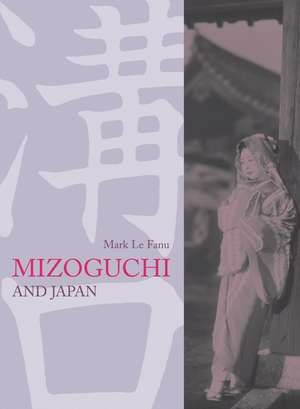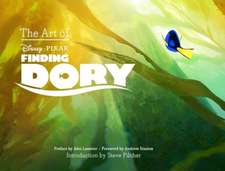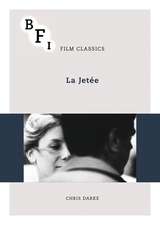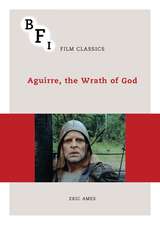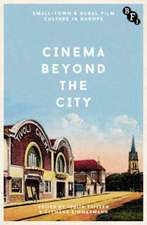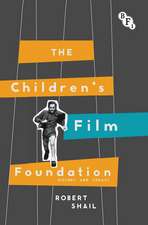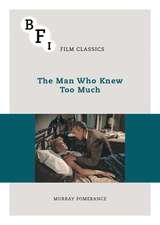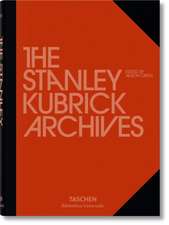Mizoguchi and Japan
Autor Mark Le Fanuen Limba Engleză Paperback – 7 iun 2005
Preț: 234.64 lei
Preț vechi: 306.98 lei
-24% Nou
Puncte Express: 352
Preț estimativ în valută:
44.90€ • 46.88$ • 37.16£
44.90€ • 46.88$ • 37.16£
Carte tipărită la comandă
Livrare economică 05-19 aprilie
Preluare comenzi: 021 569.72.76
Specificații
ISBN-13: 9781844570577
ISBN-10: 1844570576
Pagini: 238
Ilustrații: illustrated
Dimensiuni: 155 x 235 x 15 mm
Greutate: 0.54 kg
Ediția:2005
Editura: Bloomsbury Publishing
Colecția British Film Institute
Locul publicării:London, United Kingdom
ISBN-10: 1844570576
Pagini: 238
Ilustrații: illustrated
Dimensiuni: 155 x 235 x 15 mm
Greutate: 0.54 kg
Ediția:2005
Editura: Bloomsbury Publishing
Colecția British Film Institute
Locul publicării:London, United Kingdom
Notă biografică
Mark Le Fanu lives and works in Denmark, where he is director of film history at the European Film College. Besides his interest in Japanese cinema, he is the author of a widely-acclaimed pioneer study of the Russian film-maker Tarkovsky (The Cinema of Andrei Tarkovsky, BFI books), and is a frequent contributor to journals such as Sight & Sound and Positif.
Recenzii
Le Fanu's love for Japanese cinema as a whole is advantageous . Though he appreciates the uniqueness of Mizoguchi's art, Le Fanu is careful to situate it in a rich national tradition . His book is beautifully written: its prose is clear, precise and jargon-free, offering an aesthetic interpretation, rather than a dissection of Mizoguchi's work along ideological or theoretical lines.
Le Fanu is a refreshing anomaly in contemporary academic film criticism.
I offer Le Fanu the highest compliment that can be paid a critic: his book made me want to rush out and screen every Mizoguchi film I could lay my hands on.
Like all critics worthy of the name, Le Fanu goes to great pains to retrace the spiritual path of the artist he is writing about, sharing with us his intellectual curiosity and in doing so displaying a profound knowledge of the arts and the history, the literature and the customs of Japan . Le Fanu here makes a major contribution to our knowledge of this great Japanese master.
As the title indicates, the author sets Mizoguchi's films within the wider context of Japanese history, culture and society, of which he has acquired an astonishing knowledge . [Le Fanu] wrote an earlier book on Tarkovsky, and this new work is even more impressive in its scholarship and attention to detail.
If you want to know more about Mizoguchi, I can make no higher recommendation than Mark Le Fanu's Mizoguchi and Japan. Le Fanu's writing is beautifully structured: he moves logically from topic to topic. He is logical because, after all, in film writing, to talk about one thing is usually to talk about everything. Mizoguchi and Japan, then, ends up inevitably casting its net wider, making it surely one of the best film books of the year.
We have waited twenty years for a decent new book on the subject. We are fortunate to have got one as good as this.
Le Fanu is a refreshing anomaly in contemporary academic film criticism.
I offer Le Fanu the highest compliment that can be paid a critic: his book made me want to rush out and screen every Mizoguchi film I could lay my hands on.
Like all critics worthy of the name, Le Fanu goes to great pains to retrace the spiritual path of the artist he is writing about, sharing with us his intellectual curiosity and in doing so displaying a profound knowledge of the arts and the history, the literature and the customs of Japan . Le Fanu here makes a major contribution to our knowledge of this great Japanese master.
As the title indicates, the author sets Mizoguchi's films within the wider context of Japanese history, culture and society, of which he has acquired an astonishing knowledge . [Le Fanu] wrote an earlier book on Tarkovsky, and this new work is even more impressive in its scholarship and attention to detail.
If you want to know more about Mizoguchi, I can make no higher recommendation than Mark Le Fanu's Mizoguchi and Japan. Le Fanu's writing is beautifully structured: he moves logically from topic to topic. He is logical because, after all, in film writing, to talk about one thing is usually to talk about everything. Mizoguchi and Japan, then, ends up inevitably casting its net wider, making it surely one of the best film books of the year.
We have waited twenty years for a decent new book on the subject. We are fortunate to have got one as good as this.
